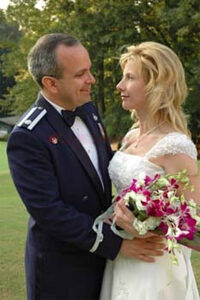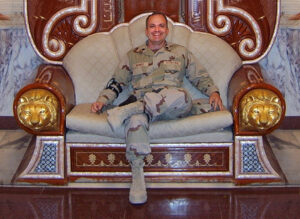



Made In Taiwan
My father served in Taiwan as a United States Air Force (USAF) reconnaissance pilot. Shortly after I was born, we returned to the United States. Growing up, stories about his experience, comradery, and the professional persona he displayed sealed my decision to join the USAF. Seeking a similar level of comradery and adventure as my father, I graduated through the USAF Reserve Officers’ Training Corps (ROTC) program at the University of Arizona in 1987.
As I entered the Air Force, my father retired from his last assignment as the US Air Force liaison to US Force Command. My first stop was technical training at Keesler Air Force Base (AFB) where my passion for integrating computers to support mission processes grew.
After training, my adventure began as one of three hundred 2nd Lieutenants (2Lt) in my career field assigned to 7th Communications Group (7thCG) at the Pentagon (Washington DC). The assignment provided critical technical and project management skills that would launch my career. My enduring interest in network attack and defense emerged from this assignment.
My priority was supporting the time sensitive radical transition of the US Air Force budget system from an isolated multi-level secure mainframe computer to a distributed mini-computer network using the new C++ programing language. With a million-dollar budget, access to the latest commercial technology, and attending sales pitches from Steve Jobs, I was in IT heaven. Nothing was impossible! I maintained that “can do” mindset throughout my career.
Be Good, But Replaceable
By year four, only 30 of the 300 remained. The term “reduction in force” seemed to be a standard catchphrase. Now short on experienced personnel, it was a challenge to be reassigned. After five years on station, I learned a valuable lesson. Perform your job well but train your replacement. Soon, I was on my way to Ramstein Air Base to serve as communications project manager supporting the USAFE intelligence community.
My exposure to theater intelligence systems expanded my understanding of the Air Force operational mission. A key accomplishment was supporting the transition of cold war era intelligence bunkers to the new Air Intelligence Squadron framework. I was privileged to work with exceptional team members to improve reach-back communications for United Nations Operations DENY FLIGHT (no-fly zone over Bosnia and Herzegovina) and PROVIDE PROMISE (humanitarian relief portion). This time was marked by wonderful peers and mentors alike that would raise my experience level.
Good assignment, Bad assignment, It’s Your Choice.
By the end of my second year, I was notified of my assignment to a remote location in South Korea where the majority of personnel (to include the Wing Commander) had been removed for failing an operational inspection. Though it was not the ideal situation to walk into, I made the choice to do everything I could to get them back on track.
In June of 1995, I was heading to Kunsan Air Base, Korea. Kunsan is home to the 86th Fighter Wing (The Wolf Pack) – an F-16 fighter base located between a land-mined beach head and farmer mud paddies. Arriving at a remote base in an austere environment, I managed my expectations. In a time of poor morale from the failed inspection, the new Wing Commander produced a sense of family and pride in the mission. The commander made it crystal clear that daily mission readiness was more important than passing an inspection. He asked each person to prepare for a potential war, not a test. As a flight chief I was in-charge of 80 personnel providing secure communications support for Airfield operations and across the base. Within a few months the Wing passed re-inspection with flying colors. Looking back, this resource-constrained base turned out to be the best assignment of my career!
Proficiency Is A Moving Target
I was starting to understand that each Air Force assignments was an opportunity for growth to take on more challenging tasks in the future. Once proficient, proceed to the next challenge. It is often necessary to reassess your experience with each new challenge. Avoid the three most dangerous words, “ I know that”.
My next station was Hickam Air Force Base, Hawaii. While assigned here, I actually spent more time in Korea as part of my duties than my total time at Kunsan Air Base. I was the communications lead supporting critical repairs to the Korean theater Air Picture for integration into the new Global Command & Control System (GCCS). Completing this task, I was promoted to Major and placed in charge of a branch with the mission to field GCCS across Pacific Air Forces. After completing my task and training my replacement, I became the senior executive officer for the Director of Communications.
In February 2000 I was on my way to Colorado Springs, as member of the USSPACOM/J6 staff. My responsibilities included development of “what if” scenarios and recommended responses for DoD cyber defense plans. While a rewarding time, I barely had time to earn my space badge. I was soon on my way to Air Command & Staff College at Maxwell AFB by February 2001.
In June 2002 I was headed to Headquarters United States Air Force (Pentagon), but this time officed in Rosslyn, Virginia due to on-going repairs. I was fortunate to work with exceptional individuals (contractor, government civilian, and military) supporting Air Force Deputy Chief of Staff for Warfighting Integration. My knowledge of large program management and the USAF budget process significantly improved. My responsibilities included tracking and defending the communications programmatic funding for Global Hawk, Distinguished Visitor (i.e. Presidential) and Predator aircraft communications. Aligning funding with mission capability ensured priority missions remained ready at that time and in the future. I was lucky enough to work with some amazing scientists on mapping advanced technology projects to Air Force mission areas. Having hit the two-year mark on station and promoted to Lieutenant Colonel, my next challenge arrived.
Second Mouse Gets the Cheese
 In Jun 2004, I was heading back to Ramstein AB Germany as a new Lieutenant Colonel to assume command of the 1st Air & Space Communications Operations Squadron. Of all my assignments this proved to be the most important assignment in my life. While heading back from a military graduation ceremony I volunteered to exchange my seat with a couple on our aircraft to allow them to sit together. That fateful swap put me next to the woman who would become my wife. In Aug 2005 we were married over the weekend that Hurricane Katrina hit. Our New Orleans honeymoon was cancelled. A couple weeks later, I was commanding the 447th Expeditionary Communications Squadron at Baghdad International Airport, Iraq. Not the honeymoon we would have hoped for, but Tracy understood my responsibility to urgently deploy. I promised her a proper honeymoon upon my return.
In Jun 2004, I was heading back to Ramstein AB Germany as a new Lieutenant Colonel to assume command of the 1st Air & Space Communications Operations Squadron. Of all my assignments this proved to be the most important assignment in my life. While heading back from a military graduation ceremony I volunteered to exchange my seat with a couple on our aircraft to allow them to sit together. That fateful swap put me next to the woman who would become my wife. In Aug 2005 we were married over the weekend that Hurricane Katrina hit. Our New Orleans honeymoon was cancelled. A couple weeks later, I was commanding the 447th Expeditionary Communications Squadron at Baghdad International Airport, Iraq. Not the honeymoon we would have hoped for, but Tracy understood my responsibility to urgently deploy. I promised her a proper honeymoon upon my return.
My squadron of 55 dedicated airmen supported the on-time rotation of 66K army personnel, the Iraq referendum vote, integration of a new air defense system, and daily airfield operations (to include US Mail). An incredible task performed by the airmen I served.
 By February 2006 I was back at Ramstein Air Base and preparing for re-assignment to Headquarters US Special Operations Command (USSOCOM). As Tracy and I strolled the streets of Santorini, we reflected at how sometimes delayed gratification makes for a sweeter reward.
By February 2006 I was back at Ramstein Air Base and preparing for re-assignment to Headquarters US Special Operations Command (USSOCOM). As Tracy and I strolled the streets of Santorini, we reflected at how sometimes delayed gratification makes for a sweeter reward.
At USSOCOM you were measured by what you brought to the table, not your rank or accolades. As the Chief of Information Assurance Division, my team transformed cybersecurity for command to include the stand-up of a 24×7 watch. While another rewarding assignment, it also allowed time for me to earn my Certified Information System Security Professional (CISSP) and self-reflect on my life goals.
Define Your Own Success.
Do not let others define success for you. In my opinion, the Air Force is not a career path, location, or assignment. It is the network of extraordinary people whom you support and who support you. While my successful Air Force career was influenced at times by luck, skill, and perhaps divine intervention, it was wholly successful due to the people I served and the leadership skills I gleaned from my leaders.
2009 marked my retirement from US Air Force and launch as a cyber security contractor supporting the 513th Military Intelligence Brigade in Augusta, Georgia. My joint military intelligence background paid off in presenting new ideas to my Army customer. In 2011 I deployed to Bagram Air Base, Afghanistan for six months to resolve cybersecurity concerns with an Army theater intelligence system. By 2014 I found myself in a management position with my team providing cybersecurity support across multiple army sites worldwide. I noticed a disturbing trend. A staffing culture of quantity over quality was emerging. I no longer felt that my values were aligned with the companies’ values.
Pave The Way Boldly
In 2016, I added a Certified Information Security Auditor (CISA) certification to my arsenal and joined Invictus International Consulting. My experience and the Invictus values were a perfect match.
The mark of great manager is the ability to assess the value of a person professionally and quickly. A great leader engages and inspires people directly. After meeting Jim Kelly, I knew I wanted to be part of this company, whose values were aligned with mine. I was excited to serve a company where the CEO knew my name, provided a personal greeting, and had actually read my resume.
Jim Kelly has a great instinct for assembling talent for their extraordinary background and future potential. I am challenged every day to expand my knowledge as I measure my performance against my Invictus peers. At 5+ years, I remain a member of the Invictus “Spartan” family with each year presenting new opportunities to grow. Most importantly, as the company has grown, the incredible culture Jim Kelly presented my first day remains.